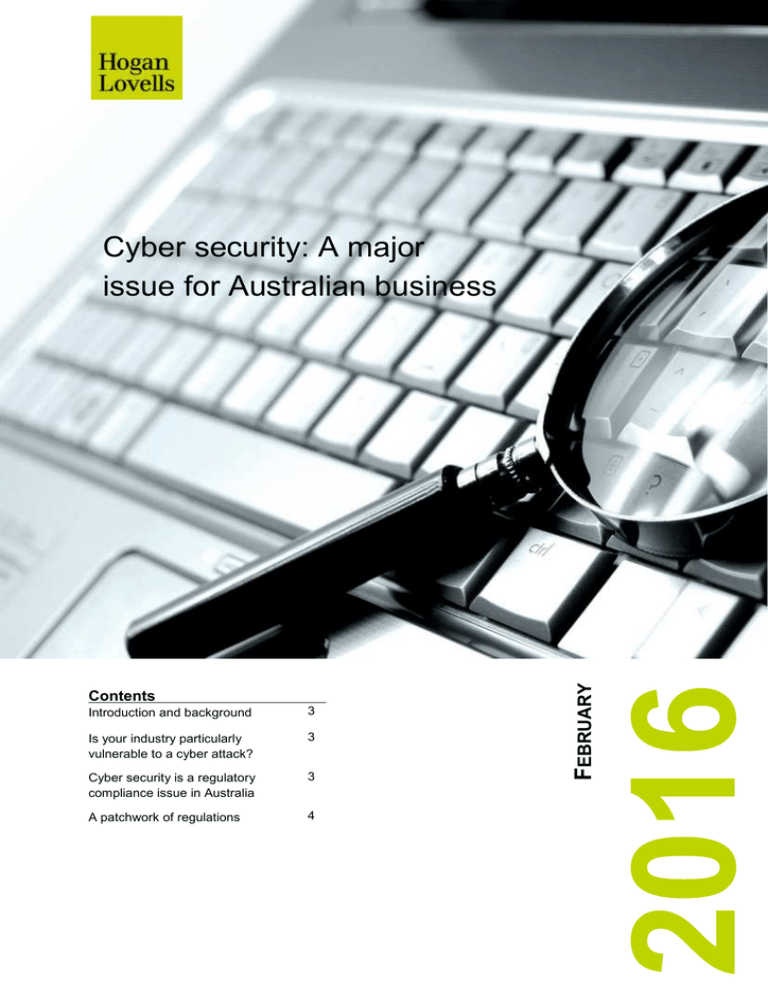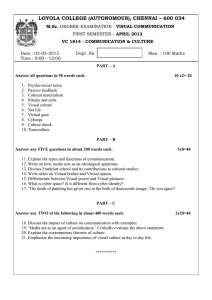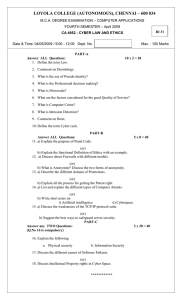
Cyber Security: A major issue for Australian business: February 2016
1
Contents
Introduction and background
3
Is your industry particularly
vulnerable to a cyber attack?
3
Cyber security is a regulatory
compliance issue in Australia
3
A patchwork of regulations
4
FEBRUARY
Cyber security: A major
issue for Australian business
2
Investing in Vietnam – July 2015
Want to know more?
If you would like further information or assistance,
drop us an email or give us a call.
Tim Lester
Head of Corporate
Partner, Australia
T +61 8 6208 6551
+61 2 9093 3501
tim.lester@hoganlovells.com
Rebecca Cifelli
Senior Associate
Perth: +61 (0) 8 6189 8663
rebecca.cifelli@hoganlovells.com
This note is written as a general guide only. It should
not be relied upon as a substitute for specific legal
advice.
Cyber Security: A major issue for Australian business: February 2016
3
Cyber security: A major issue for Australian business
Introduction and background
Cyber crime has become a major issue for Australian
businesses. Although it is difficult to establish an
accurate figure of how much cyber crime is costing
Australian businesses, in a recent study the annual
cost averaged across benchmarked organisations
(thought to represent large Australian companies)
1
was roughly $A4.9 million per year. Business
disruption appears to be the most expensive
consequence of cyber crime, followed by information
2
loss and revenue loss.
Along with the private sector, the Australian
government is also very concerned about the rise of
cyber crime. Recently it has been reported that
submarine builders in Germany, France and Japan
bidding for a $20 billion contract to build a new
Australian fleet have been subject to hacking attacks.
The bidders were holding highly sensitive information
about the Royal Australian Navy’s technical
requirements for its new-generation submarines. In
response to the attacks the government indicated
that it requires the companies it deals with to have
3
the most thorough cyber security measures in place.
More and more we are seeing businesses and
government recognise the importance of
implementing sound cyber security policies, both
within their organisations and from their business
partners.
1
Is your industry particularly vulnerable to a cyber
attack?
The energy industry appears to be the most highly
targeted with 29% of incidents responded to by
CERT Australia occurring in this sector (CERT
Australia is the point of contact in government for
cyber security issues affecting major Australian
4
businesses). The banking and financial services
and communications industries also reported a high
5
number of incidents to CERT Australia.
Unsurprisingly, businesses in these industries that
experience a high number of incidents also report
experiencing substantially higher costs associated
6
with cyber crime.
Cyber security is a regulatory compliance issue
in Australia
It makes good business sense for companies to
ensure that they are adequately protected. However,
for many businesses this is also a regulatory
compliance issue. The Australian Securities and
Investment Commission (ASIC) has advised, in its
recent guidance note "Report 429: Cyber resilience:
Health Check" issued in March 2015 (the ASIC
Guidance), that it considers cyber resilience to be a
high-risk area that will be considered in ASIC's
surveillance programs of regulated entities. So it is
important that companies understand the regulations
and know what they need to do to comply.
Depending on the severity of a breach, a failure to
identify and manage cyber risk could result in fines,
penalties, enforceable undertakings, licensing
conditions or a licence suspension or cancellation.
For directors or officers, a breach may result in
7
disqualification.
"2015 Cost of Cyber Crime Study: Australia", Ponemon
Institute, September 2015.
2
"2015 Cost of Cyber Crime Study: Australia", Ponemon
Institute, September 2015.
3
"Cyber torpedo alert: China, Russia hack submarine plans of
4
5
6
bidders", The Australian, 9 November 2015; "Cyber security just
can't hack it, says Peter Leahy", The Australian, 10 November
2015.
"Australian Cyber Security Centre 2015 Threat Report", 2015
"Australian Cyber Security Centre 2015 Threat Report", 2015
"2015 Cost of Cyber Crime Study: Australia", Ponemon
Institute, September 2015.
7
The ASIC Guidance
4
The ASIC Guidance talks about "Cyber resilience",
meaning the ability to prepare for, respond to and
recover from a cyber attack. Resilience is more than
just preventing or responding to an attack – it also takes
into account the ability to operate during, and to adapt
and recover, from such an event.
The regulatory requirements imposed on a company
will depend on the nature of its business.
Of course, as noted above, some businesses are more
exposed to cyber risks than others and ASIC has stated
that they expect businesses to take a proportionate
approach.
Directors
For directors, cyber risks may affect director's duties
and annual director report disclosure requirements. For
example, directors have duties to act with reasonable
care and diligence.
Disclosure obligations
For companies with corporate disclosure requirements,
cyber risks may need to be disclosed. This will depend
on how exposed the business is to a cyber attack and if
investors reasonably require information about cyber
risks in order to make informed decisions. In particular,
cyber risks may need to be addressed in a prospectus
and/or annual report.
If a company suffers a cyber attack, it may need to
disclose this as market-sensitive information.
Listed Entities
The Australian Securities Exchange's "Corporate
Governance Principles and Recommendations"
recommend that listed entities establish a sound risk
management framework and periodically review the
effectiveness of that framework. Cyber risks should be
taken into account in this regard.
Entities regulated by the Privacy Act 1988 (Cth)
(Privacy Act)
The Privacy Act regulates most Australian and Norfolk
Island Government agencies, all private sector and notfor-profit organisations with an annual turnover of more
than $3 million, all private health service providers and
some small businesses (collectively called ‘APP
entities’).
APP entities must take reasonable steps to protect
personal information they hold from misuse,
interference and loss and from unauthorised access,
use, modification or disclosure.
Cyber Security: A major issue for Australian business: February 2016
The Office of the Australian Information Commissioner
(OAIC) recommends that, if there is a real risk of
serious harm as a result of a data breach, the affected
individuals and the OAIC be notified. We expect to see
amendments to the Privacy Act making this a
mandatory requirement in 2016. In December 2015 the
Attorney-General’s Department released an exposure
draft of the Privacy Amendment (Notification of Serious
Data Breaches) Bill 2015, which will, if passed, require
entities subject to the Privacy Act to notify the OAIC and
any affected individual of a “serious data breach”.
A patchwork of regulations
In addition to the general regulations mentioned above,
further regulations may apply depending on the nature
of a particular business (for example, entities providing
financial services will have additional obligations). In
Australia there are no specific cyber security regulations
that apply generally to Australian businesses. Rather,
Australia has a patchwork of regulations that apply to
different kinds of entities and create general obligations
to manage risk and act with reasonable care. The ASIC
Guidance has confirmed cyber security will be
considered in the context of these general obligations.
This means that it is important that businesses
operating in Australia understand what regulations
apply to them.
Progress in technology and increasing dependence on
online systems mean that cyber security will continue to
be a major issue for Australian businesses. Given the
potential consequences of a cyber attack, it makes
good business sense to be prepared with sound cyber
security policies in place. It is also necessary given the
regulatory obligations on Australian companies and
their directors.
www.hoganlovells.com
Hogan Lovells has offices in:
Alicante
Amsterdam
Baltimore
Beijing
Brussels
Budapest*
Caracas
Colorado Springs
Denver
Dubai
Dusseldorf
Frankfurt
Hamburg
Hanoi
Ho Chi Minh City
Hong Kong
Houston
Jeddah*
Johannesburg
London
Los Angeles
Luxembourg
Madrid
Mexico City
Miami
Milan
Minneapolis
Monterrey
Moscow
Munich
New York
Northern Virginia
Paris
Perth
Philadelphia
Rio de Janeiro
Riyadh*
Rome
San Francisco
São Paulo
Shanghai
Silicon Valley
Singapore
Sydney
Tokyo
Ulaanbaatar
Warsaw
Washington DC
Zagreb*
Hogan Lovells in Australia is part of the Hogan Lovells international legal practice that includes Hogan Lovells International LLP, Hogan Lovells US LLP and their affiliated
businesses.
Level 17, 20 Martin Place, Sydney NSW 2000, Australia
Level 13, St Georges Square, 225 St Georges Terrace, Perth WA 6000, Australia
The word "partner" is used to describe a partner or member of Hogan Lovells International LLP, Hogan Lovells US LLP or any of their affiliated entities or any employee or consultant
with equivalent standing. Certain individuals, who are designated as partners, but who are not members of Hogan Lovells International LLP, do not hold qualifications equivalent to
members.
For more information about Hogan Lovells, see www.hoganlovells.com.
Where case studies are included, results achieved do not guarantee similar outcomes for other clients. Attorney Advertising.
©Hogan Lovells 2016. All rights reserved.
*Associated offices


